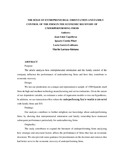Mostrar el registro sencillo del ítem
The role of entrepreneurial orientation and family control of the firm in the economic recovery of underperforming firms
| dc.creator | Capelleras Segura, Joan Lluís | es_ES |
| dc.creator | Contín Pilart, Ignacio | es_ES |
| dc.creator | Garcés Galdeano, Lucía | es_ES |
| dc.creator | Larraza Kintana, Martín | es_ES |
| dc.date.accessioned | 2020-05-29T07:13:44Z | |
| dc.date.available | 2020-05-29T07:13:44Z | |
| dc.date.issued | 2019 | |
| dc.identifier.issn | 1012-8255 | |
| dc.identifier.uri | https://hdl.handle.net/2454/37002 | |
| dc.description.abstract | Objetivo – El artículo analiza cómo la orientación emprendedora y el control familiar de la empresa influyen en el desempeño de las empresas con bajo rendimiento y cómo contribuyen a su recuperación económica. Diseño/metodología/enfoque – Testamos nuestras hipótesis utilizando una muestra única y representativa de 1,500 pequeñas empresas españolas en industrias de fabricación y servicios de alta y media tecnología. Dada la naturaleza de nuestra variable dependiente, estimamos una serie de modelos de regresión para probar nuestras hipótesis. Además, consideramos dos términos de interacción donde la variable de las empresas de bajo rendimiento interactúa con las empresas familiares y la orientación emprendedora. Hallazgos – Los resultados de nuestros análisis muestran que las empresas con mayor orientación emprendedora y cuya propiedad sea familiar aumentan, por separado, el rendimiento posterior de las empresas, especialmente para las de bajo rendimiento. Originalidad/valor – El estudio contribuye a expandir la literatura sobre las empresas con bajo rendimiento al analizar cómo los factores estratégicos y estructurales impactan en el desempeño de las empresas que enfrentan una recesión económica. También brinda orientación a los profesionales sobre la decisión y los contextos que mejor sirven para la recuperación económica de las empresas con bajo rendimiento. | es_ES |
| dc.description.abstract | Purpose: The purpose of this paper is to analyse how entrepreneurial orientation (EO) and the family control of the company influence the performance of underachieving firms and how they contribute to economic recovery. Design/methodology/approach: The authors test the authors’ predictions on a unique and representative sample of 1,500 Spanish small firms in high and medium technology manufacturing and service industries. Given the nature of the dependent variable, the authors estimate a series of regression models to test the hypotheses. In addition, the authors consider two interaction terms where the underperforming firms’ variable is interacted with family firms and EO. Findings: The results of analyses show that both EO and family ownership separately increase subsequent performance for underachieving firms. Originality/value: The study contributes to expand the literature on underperforming firms analysing how strategic and structural factors affect the performance of firms that face an economic downturn. It also provides some guidance for practitioners on the decision and contexts that better serve the economic recovery of underperforming firms. | en |
| dc.description.sponsorship | The authors acknowledge the support from the Spanish Ministry of Economy, Industry, and Competitiveness and the European Regional Development Fund (FEDER) through projects ECO2017-86305-C4-4-R (AEI/FEDER, UE), ECO2017-86054-C3-1-R (AEI/FEDER, UE) and ECO2017-86054-C3-2-R (AEI/FEDER, UE). | en |
| dc.format.extent | 36 p. | |
| dc.format.mimetype | application/pdf | en |
| dc.language.iso | eng | en |
| dc.publisher | Emerald | en |
| dc.relation.ispartof | Academia Revista Latinoamericana de Administración, 2019 | es_ES |
| dc.rights | © 2019, Emerald Publishing Limited | en |
| dc.subject | Pequeñas empresas | es_ES |
| dc.subject | Empresas familiares | es_ES |
| dc.subject | Riqueza socioemocional | es_ES |
| dc.subject | Orientación emprendedora | es_ES |
| dc.subject | Empresas con bajo rendimiento | es_ES |
| dc.subject | Small firms | en |
| dc.subject | Family firms | en |
| dc.subject | SEW | en |
| dc.subject | EO | en |
| dc.subject | Underperforming firms | en |
| dc.title | The role of entrepreneurial orientation and family control of the firm in the economic recovery of underperforming firms | en |
| dc.title.alternative | El papel de la orientación emprendedora y el control familiar de la empresa en la recuperación económica de las empresas de bajo rendimiento | es_ES |
| dc.type | info:eu-repo/semantics/article | en |
| dc.type | Artículo / Artikulua | es |
| dc.contributor.department | Gestión de Empresas | es_ES |
| dc.contributor.department | Enpresen Kudeaketa | eu |
| dc.contributor.department | Institute for Advanced Research in Business and Economics - INARBE | es_ES |
| dc.rights.accessRights | info:eu-repo/semantics/openAccess | en |
| dc.rights.accessRights | Acceso abierto / Sarbide irekia | es |
| dc.identifier.doi | 10.1108/ARLA-03-2018-0081 | |
| dc.relation.projectID | info:eu-repo/grantAgreement/AEI/Plan Estatal de Investigación Científica y Técnica y de Innovación 2013-2016/ECO2017-86305-C4-4-R/ES/ | en |
| dc.relation.projectID | info:eu-repo/grantAgreement/AEI/Plan Estatal de Investigación Científica y Técnica y de Innovación 2013-2016/ECO2017-86054-C3-2-R/ES/ | en |
| dc.relation.publisherversion | https://doi.org/10.1108/ARLA-03-2018-0081 | |
| dc.type.version | info:eu-repo/semantics/acceptedVersion | en |
| dc.type.version | Versión aceptada / Onetsi den bertsioa | es |


